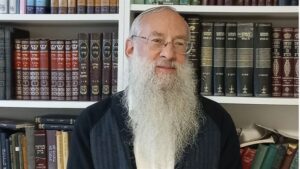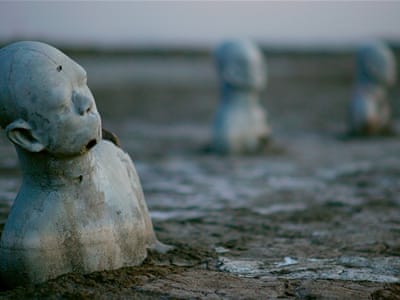Don’t Bury Me in Egypt!
by Rabbi Moshe Kaplan, Machon Meir Faculty

In the Torah portion of Vayichi, Yaakov asks his sons to show him kindness and not bury him in Egypt. Rather Yaakov wants to be buried with his forefathers in the Maarat HaMachpelah, in the Cave of the Partriarchs in Hevron (Vayichi 47:29-30; 49:29). Why is it so important to Yaakov to be buried in Eretz Yisrael and not in Egypt? HaRav Chaim Druckman, of blessed memory, answers this question in his book on the Torah portions. As always, he bases his conclusions on the teachings of our Sages of old.
The Torah commentator Rashi (Yayichi 47:29) lists three reasons for the request. Firstly he says that Yaakov saw into the future to when the land of Egypt would be stricken with the Plague of Lice, when the dust of the earth would turn into lice (Shmot 8:12-13). Obviously, Yaakov wished that his corpse would be spared this unpleasant scenario. Secondly, when a person dies outside of the Land of Israel, in order to have a share in the future resurrection of the dead, a corpse must roll through underground tunnels to the Holy Land, the Land of Life, the only place where resurrection occurs. Accordingly, Yaakov did not want to suffer the terrible pain involved in this process demanded of all Jews who were buried in the impure lands of the gentiles. The third reason, states Rashi, is that Yaakov did not want his burial place in Egypt to be turned into a place of idolatry.
However, there exist ways that Yaakov could have avoided the unpleasant consequences of each of these three reasons. Regarding the lice, Yaakov could have asked to be buried in a coffin made from some kind of material like metal which lice can’t penetrate. Regarding his desire to avoid the anguish of underground relocation, Yaakov could have requested to be placed in a coffin until the Children of Israel departed from Egypt (just as Yosef later did) and then be brought with them to the Land of Israel where resurrection takes place, thus avoiding the painful tunnels. As we mentioned, the third reason Yaakov didn’t want to be buried in Egypt was because he didn’t want them to turn him into an object of worship in their idolatrous practices. He knew that he was revered by the Egyptians because of the fact the long famine had suddenly ended when he had arrived in the land. Thus he feared that idol-worshipping Egyptians would make him and his gravesite into an object of their worship. There is also a solution to this problem – Yaakov could have asked Yosef to bury him in a hidden place that no one knew about, like in the case of Moshe Rabenu. As the common saying goes: out of sight, out of mind. Not knowing where he was buried, the Egyptians wouldn’t be able to turn him into an idol.
The Maharal (Gur Aryeh Breishit 47:30) states that Yaakov could have avoided all the three things he feared by asking Yosef to remove him from the land of Egypt. This way there would be no problem with lice. Once outside of Egypt his corpse could later brought to Eretz Yisrael before the resurrection of the dead to avoid underground travel. Furthermore, once he was outside of Egypt, the Egyptians wouldn’t trouble themselves to journey to his place of burial. Nevertheless, even though Yaakov had ways of countering his worries, he still insisted to be brought out from Egypt immediately and be buried in Eretz Yisrael. Why?
Rabbi Druckman cites a teaching from the Midrash (Mishnat Rabbi Eliezer 19) who proposes another reason why Yaakov did not want to be buried in Egypt – so that his sons, the tribes of Israel, shouldn’t remain in Egypt and “mistakenly think that Egypt must be a holy place if our righteous father Yaakov was buried there.” The Children of Israel might come to the conclusion that if Egypt is holy we have no need to go back to Eretz Yisrael. To avoid the possibility of this terrible error Yaakov insisted that his body be removed from Egypt as quickly as possible. Yaakov wanted his children to know that not only was Egypt the wrong place to die, it was the wrong place to live. He didn’t want to give his children and all future Jewish offspring the excuse to settle outside of the Promised Land in opposition to Hashem’s plan for Creation. Yaakov knew that only in Eretz Yisrael could the Jewish People become a light to the nations.
We can ask, if this line of thought is the case, then why didn’t Yosef request the same when he neared the time of his death? Instead of requesting that his remains be taken out of Egypt when the Children of Israel made their exodus he could have demanded that they take him back to Israel immediately. Rabbi Druckman explains that at the time of Yosef’s death the Jews didn’t have the power to remove him from the land. In contrast, when his father died, Yosef ruled over Egypt. He had the authority and wherewithal to immediately take his father to be buried in Hevron. Similarly we find that Rashi (Vayichi 47:29) explains why Yaakov requested specifically from Yosef to bury him in the Land of Israel, since “he was the one who had in his power to do so.” Not so with his brothers who, without the protection of Yosef, were strangers in a strange land. Understanding this situation, Yosef only asked them to transport him out from Egypt when the miraculous intervention of Hashem would make his desire possible. This request is even more significant coming from Yosef who could have certainly felt at home in Egypt, having spent most of his life there, married his wife and bore children there, and especially considering his achieving the high status of authority there – and yet he remembered: Egypt is not our land!
At the end of the Torah portion Vayigash we are told that the Jews held onto (VeYe’achazu) Goshen in the land of Egypt and multiplied greatly (Vayigash 47:27). The Hebrew word “achiza” has the meaning of possession or holding on to something strongly. We also find the word in Hashem’s promise to Avraham Avinu that the Land of Israel would be his eternal “achuza” the eternal possession of the Jews (Breishit 17:8). Yet here in Vayigash we hear Yaakov’s son referring to Goshen as the land of their possession. This was their father’s fear – that after their long sojourn in Egypt the Children of Israel would come to view a foreign country as the place where they belonged. The Torah commentator the “Kli Yakar” writes that the verse in Vayigash comes as a criticism of Yaakov’s children. Hashem told them that they would be temporary strangers in the land of Egypt yet they desired to be permanent citizens. He also highlights this radical change from being temporary sojourners to wanting to be full-fledged residents of an alien country to the point where they didn’t want to leave. In a sense they were “possessed” by the land. Rabbi Shimshon Raphael Hirsh (47:29) also points out the power of this “possession” on the tribes to the point that they stopped seeing Egypt as exile! After all, the Egypt of old was a powerful and outwardly magnificent kingdom. And after people become accustomed to one place it is difficult to uproot and move to another.
Tragically this same distorted orientation to true Jewish identity exists throughout the Diaspora where Jews see themselves as Americans or Frenchmen or Australians. There too the land and the outwardly attractive cultures presiding there act as a type of quicksand. For a great many Jews in the Diaspora, Eretz Yisrael is like a children’s fable, and the exclamation “Next year in Jerusalem” isn’t taken to heart. Even religious Jews in the Diaspora believe they have everything needed to fulfill a full Jewish life – synagogues, mikvaot, kosher restaurants…. This is the very thing which Yaakov Avinu feared – that his descendants would seek to establish a new home in a foreign place. Rabbi Hirsh and the Kli Yakar explain that the Torah relates their behavior as a criticism which comes to emphasize that Hashem wants His children to dwell in the Land of Israel, the only place where the Jewish People can be sovereign in a country of their own where they are to establish the Kingdom of God on Earth, as stated in the Torah again and again and reaffirmed by all the Prophets of Israel. We see that indeed their clinging to Egypt led to the motley situation whereby Hashem later had to take them out of Egypt with a forceful and mighty hand. Even then eighty percent of the Jews wanted to remain in Egypt and subsequently perished during the Plague of Darkness (see Rashi on the verse, Shemot 13:18). Rabbi Hirsh remarks that these Jews stopped feeling that they were in exile. They had the magnificent Nile River close at hand. Why did they need the much smaller Jordan River back in Israel? Sensing this danger, our forefather “Yaakov adamantly commanded them not to bury him in Egypt, rather to take him back to their TRUE homeland, as if to say to his children, “You wish to live in Egypt? I refuse even to be buried there!”






